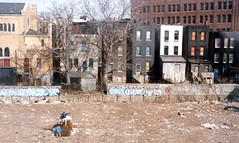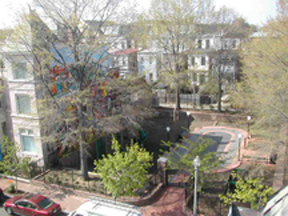Gentrification article in USA Today
The other day USA Today published, "Gentrification a boost for everyone: Researchers say changes to poor neighborhoods encourage people to stay", which is about the research of Lance Freeman, a professor at Columbia University. This work was first reported in a short piece in the New York Times more than one year ago. The finding, that there isn't displacement, is counter-intuitive. But as the article points out, people stay by (1) spending more of their income stream on housing and (2) by increasing the number of people living within the dwelling (all paying towards the cost of housing).
Which playground would you rather play on? And would your parents sacrifice to help you do so?
 Children playing on an abandoned bedspring in a South Bronx "Playground." Photo by Dan Hagerman.
Children playing on an abandoned bedspring in a South Bronx "Playground." Photo by Dan Hagerman. DC's Westminster Playground, from the
DC's Westminster Playground, from the Anyway, here is an excerpt about this from the pro-urb listserv.
Konrad Perlman (a DC resident) wrote:
I think statistical games are being played by people who are white and comfortable.[RL note: Lance Freeman is African-American] Change is inevitable and someone always suffers. But tell that to a poor person living in a downscale neighborhood, and being of color, when his residence, owned or not, is bought up and transferred to us privileged people. That's like saying it's ok to get a communicable disease because it builds immunity. Think of the sufferer! We white folks insist on dominating every scene, when, in fact, we are a minority world wide. And that goes for all of the dominant classes as well, regardless of color, who think their power is justifiable in every case, even when they practice genocide.
Richard Layman replied:
I haven't read either article (USA Today or UAR), but I heard Lance Freeman speak in January. One of the problems with big quantitative studies is that I feel you end up not asking very interesting and useful questions. In fact, Randy Stoecker discusses this in his new book on community-based research methods (which looks to be a really good book).
But in any case, Prof. Freeman discussed with us the qualitative questioning that they did some of in the neighborhoods they studied in NYC. And that is how he came up with the learning about why there isn't displacement, which let's admit, is a finding that is counter-intuitive.
The answer is simple actually. People want to stay because it's a really nice neighborhood.
They just pay a lot more for it.
I don't have my notes handy but I think the low-income people ended up spending between 58-70%+ of their income stream in rent. That's why there isn't substantive displacement, because people are making great financial sacrifices to stay in nice places. We didn't discuss what things people are giving up.
Steve Mouzon wrote:
And people making great sacrifices to stay in great recovering places is worse than people surviving or tolerating hideous, dehumanizing places???????????
David Brain wrote:
Yes, in fact it can be. For those who are able to make those sacrifices, there are lots of others who do get displaced and end up in far more hideous, more dehumanizing places. It's always important to recognize when you aren't really solving a problem but only moving it around so you don't have to look at it. The costs in human suffering can be quite high.
Nathan Landau wrote:
What people give up in situations of paying 50% and more for rent is often food, literally. People face the lovely choice of buying food or paying rent. Certainly everyone wants improved neighborhoods, but a decent society could do it without exacting this kind of toll on people.
Richard Layman wrote:
I was just making the point that we need to look, as a country, at the issue of how people afford to be able to stay in nice communities. Everybody "deserves" livable places in my opinion, regardless of income.
I think that calling attention to the "reason" why displacement "isn't happening" is important.



0 Comments:
Post a Comment
<< Home